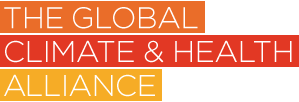
In December 2012, the steering group members of the Global Climate and Health Alliance drafted the ‘Doha Declaration on Climate, Health and Wellbeing’.
The Doha Declaration on Climate, Health and Wellbeing
‘Health must be central to climate action’
Health and medical organizations from around the world are calling for the protection and promotion of health to be made the one of the central priorities of global and national policy responses to climate change.
The protection of health and welfare is one of the central rationales for reducing emissions in Article One of the United Nations Framework Convention on Climate Change (UNFCCC). Article Four requires all countries to consider the health implications of climate adaptation and mitigation. Yet health is being overlooked in the development of responses to climate change, and its importance undervalued by policymakers, business and the media.
Human health and wellbeing is a basic human right, and contributes to economic and social development. It is fundamentally dependent on stable, functioning ecosystems and a healthy biosphere. These foundations for health are at risk from climate change and ecological degradation.
Health as a driver for mitigation and adaptation
The impact of climate change on health is one of the most significant measures of harm associated with our warming planet. Protecting health is therefore one of the most important motivations for climate action.
Climate change is affecting human health in multiple ways: both direct – through extreme weather events, food and water insecurity and infectious diseases – and indirect – through economic instability, migration and as a driver of conflict.
The risks to health from climate change are very large and will affect all populations, but particularly children, women and poorer people and those in developing nations. Urgent and sustained emissions reductions as well as effective adaptation are needed.
Climate action can deliver many benefits to health worldwide. Reducing fossil fuel consumption simultaneously improves air quality and improves public health. Shifting to cleaner, safer, low carbon energy systems will save millions of lives each year. Moving to more active lifestyles and expansion of and access to public transport systems can improve health through increased physical activity and reduced air pollution. Improving insulation in homes and buildings can protect people from extreme temperatures and reduce energy consumption. All of these changes will provide significant economic savings. Climate action that recognises these benefits can improve the health of individuals and communities, support resilient and sustainable development, and improve global equity.
What we seek from climate action
Recognising that health in all policies and strengthening health systems globally can advance human rights and help create safe, resilient, adaptable, and sustainable communities, we call for:
- The health impacts of climate change to be taken into account domestically and globally
- Health impacts and co-benefits to be fully evaluated, costed and reflected in all domestic, regional and global climate decisions on both mitigation and adaptation;
- Health and environmental costs to be reflected in corporate and national accounts;
- Assessment of loss and damage from climate change to include impacts on human health, wellbeing and community resilience, as well as impacts to health care infrastructure and systems;
- Investment in climate mitigation and adaptation to be significantly increased on a rapid timescale
- Priority given to decarbonisation of national and global energy supplies;
- Cessation of fossil fuel subsidies globally and greater funding for renewable and clean technologies;
- Funding for programs to support and protect health in vulnerable countries to be significantly increased;
- Investment in adaptation and mitigation programs that can demonstrate health benefits to be substantially increased;
- The health sector and the community to be engaged and informed on climate action
- The health sector to be engaged and included in the processes of designing and leading climate mitigation and adaptation worldwide;
- National and global education programs to increase public awareness of the health effects of climate change and promote the health co-benefits of low carbon pathways; and
- More inclusive consultation processes in global climate negotiations to reflect the views of young people, women and indigenous people
Our Future
Human health is profoundly threatened by our global failure to halt emissions growth and curb climate change. As representatives of health communities around the world, we argue that strategies to achieve rapid and sustained emissions reductions and protect health must be implemented in a time frame to avert further loss and damage.
We recognise that this will require exceptional courage and leadership from our political, business and civil society leaders, including the health sector; acceptance from the global community about the threats to health posed by our current path ; and a willingness to act to realise the many benefits of creating low carbon, healthy, sustainable and resilient societies.
‘You cannot tackle hunger, disease and poverty unless you can also provide people with a healthy ecosystem’
– Gro Harlem Brundtland
Signatories to the Doha Declaration on Climate, Health & Wellbeing:
Action for Humane Hospitals
African Coalition on Green Growth
AJOMED: Associação Dos Jovens Médicos
Alderhey NHS Trust
Almaa Organization
Architects Designers and Planners for Social Responsibility
Asian Medical Students’ Association
Association for the Promotion of Youth Leadership, Advocacy and Volunteerism Cameroon (APYLAV)
Association Médicale Canadienne
Australian Association of Social Workers
Australian Croatian Community Services
Australian Federation of Medical Women
Australian Health Promotion Association
Australian Healthcare & Hospitals Association
Australian Medical Students’ Association (AMSA)
AWCC: Action for Women and Children Concern
Ayurvedic Practitioners Association
Barking, Havering and Redbridge University Hospitals NHS Trust
Benevolent Organisation for Development, Health & Insight
British Society of Gastroenterologists
C3 Collaborating for Health
Cambridge University Hospitals
Canadian Association of Physicians for the Environment
Canadian Nurses Association
CANE: Canadian Association of Nurses for the Environment
Center for Climate Change Communication
Centre for Sustainable Healthcare
Chainama College of Health Sciences, Zambia
CHASE: Canadian HEalth Association for Sustainabililty & Equity
Citizen’s Climate Lobby
Climate and Health Alliance, Australia
Climate and Health Council, UK
Climate Change Adaptation Research Network for Human Health
Climate Emergency Institute
Climate Psychiatry Alliance
CNMSE
CODA
Collège Intermutualiste National
Comité pour le développement durable en santé (C2DS)
Community Health Action Innovation & Networking
CORE Group
CYHN: The Commonwealth Youth Health Network
Doctors for the Environment, Australia
Doctors Reform Society of Australia
EarthMedic/EarthNurse
East Australia
Epilepsy Society
EuroHealthNet
European Central Council of Homeopaths
European Environment and Health Youth Coalition
European Lung Foundation
European Public Health Alliance (EPHA)
European Respiratory Society
FHI 360
Friends of the Global Fight Against AIDS, Tuberculosis and Malaria
Front Commun pour la Protection de l’Environnement et des Espaces Protégés
Fundación Vivo Sano
Gesunde Erde Gesunde Menschen
Global Advocacy for Physical Activity
Global Consortium on Climate and Health Education
Global Emergin PAthogens Treatment Consortium
Globalization and Health Equity
Green Health Wales / Iechyd Gwyrydd Cymru
Health and Climate Foundation
Health and Environment Alliance (HEAL)
Health Care Without Harm
Health Declares Climate and Ecological Emergency
Health in Harmony
Health Sector Environmental Health Practitioners Association – Ghana (HeSEHPAG)
Healthy Planet UK
HECAF 360: Health Environment & Climate Action Foundation
Hellenic Society of Environmental & Climate Medicine
Hospitais Saudáveis
ILAHITA Melbourne Community Association
INCHES
Institute of Public Health in Ireland
International Council of Nurses
International Diabetes Federation
International Federation of Gynecology and Obstetrics
International Federation of Healthcare Engineering
International Federation of Medical Students’ Associations (IFMSA)
International Primary Care Respiratory Group
International Society of Doctors for the Environment
International Women’s Health Coalition
Irish Doctors’ Environmental Association
Istituto Scientifico Biomedico Euro Mediterraneo
Italian Nurses Federation – CNAI Consociazione Nazionale Associazioni Infermiere/i
Italian Society of Doctors for the Environment
IŸAFA: International Youth Alliance for Family Planning
Jockey Club School of Public Health and Primary Care, Hong Kong
Kent and Medway PCT Cluster
KLUG: Deutsche Allianz Klimawandel und Gesundheit
Kooweerup Health Service Center
L’Associació d’Estudiants de Ciències de la Salut
La Isla Network
Liverpool Womens’ NHS Trust
Malaria No More
Medact
Médecins Du Monde
Medical Association for the Prevention of War
Medical Students for Global Awareness
Medicus Mundi
Medsin-UK
MMBSHS Trust
Montana Health Professionals for a Healthy Climate
National Medical Association, Russia
NCD Free
NDC Alliance
New Community Quarterly
New Zealand Medical Association
NHS Sustainable Development Unit (SDU)
Norwegian Medical Association
Nurses Across The Borders Humanitarian Initiative
On Call Africa
ONG Carbone Guinee
OraTaiao: The NZ Climate & Health Council
PAN: Physicians Association for Nutrition for Nutrition
Physicians for Social Responsibility
Physicians for Social Responsibility Pennsylvania
Public Health Association of Australia
Public Health Foundation of India
Public Health Institute
Quality and Accreditation Institute (QAI)
Regional Institute of Health Medicine and Research
Reproductive Health Uganda, to member page, scroller and Doha Declaration
Réseau Environnement-Santé
Royal College of General Practitioners (UK)
Royal College of Physicians
Royal College of Physicians (UK)
Rwanda #YACA
SACCC: Southern Africa Climate Change Coalition
SAHA Institute
Saluteglobale.it
San Francisco Western Region Health Centre
School of Public Health at Curtin University
SIRAD: Somali Initiatives for Relief and Development
Social Protection Resource Centre
Sociedad Chilena de Medicina de Estilo de Vida
Sociedade Portuguesa de Saúde Ambiental
Soil Association
South African Academy of Family Physicians
South African Medical Association
Sustainable Development Unit
The Centre for Sustainable Healthcare
The Chartered Institute of Environmental Health
The Filipino Nurses Association in the Nordic Region
The Humanitarian Centre
The Medical Society Consortium
The Royal College of Anaesthetists
The University of the West Indies
UK Health Alliance on Climate Change
Umeå Center for Global Health Research
United World Against Diabetes
US Climate and Health Alliance
Vasco De Gama Movement
Vermont Climate & Health Alliance
Victorian Aboriginal Community Controlled Health Organisation
WEMOS Foundation, Netherlands
WFPHA: World Federation of Public Health Associations
Whittington Health
Women’s Health
Women’s Health In the North Projeto Hospitais Saudáveis
Women’s Health in the South East
Women’s Health Loddon Mallee
WONCA — Global Family Doctor
World Cancer Research Fund
World Diabetes Foundation
World Diabetes Foundation
World Health Innovation Summit
World Medical Association
World Obesity : The World Obesity Federation
World Preservation Foundationn
Yale School of Public HEalth
Youth For Good Nepal
Zimbabwe Climate Change Coalition
Zimbabwe Environmental Health Practitioners Association


